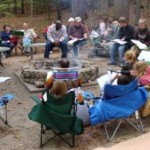Scripture… As We Live It #229
This is the 229th passage in “Scripture… As We Live It.”
Let every person be subject to vote for the governing authorities. For there is no authority except from God, and those that exist For in this way you will know which ones have been instituted by God. (Romans 13:1 re-mix)
(Please read the first post for an explanation of this series.)
Replay: Living doctrine at the campsite
Three and a half years ago, I wrote a post called “Living doctrine at the campsite.” When I wrote that post, we had just spend a weekend camping together with the church. As you can imagine, we spent alot of time together, did alot of different things together, and even talked about alot of Scripture together. At one point, we talked about Acts 2:42 together, and I realized that we had been living that passage during our camping weekend. The weekend with our brothers and sisters reminded me of the important connection between doctrine and community.
———————————–
Living doctrine at the campsite
This weekend, we went camping with the church. Friday evening, several families camped near Falls Lake. A couple of families joined us around the campfire Friday night. The next day, one family had to leave, but two more families camped with us. Several people joined us during the day on Saturday to spend time together at the campsite.
Sunday morning, many people who did not camp came to the campsite to meet together. We sat around the campfire (well, the remains of the campfire), and talked and sang and prayed. We talked about several different topics, but at one point, the discussion turned to Acts 2:42:
And they devoted themselves to the apostles’ teaching and fellowship, to the breaking of bread and the prayers. (Acts 2:42 ESV)
According to this passage, the early church in Jerusalem devoted themselves to the apostle’s teaching (or doctrine). We talked about how the church often interprets this phrase as “they spent time listening to the apostles teach”. But, as many people pointed out, this simply sentence goes far beyond listening to someone teach.
Yes, the early church continued steadfastly in the apostles’ doctrine, but they did not do this with their ears only; they continued in their lives. They lived what the apostles were teaching them.
As I was listening to my friends sitting around the campfire helping one another understand what it means to live out the doctrine of the apostles, I couldn’t help but remember the previous 48 hours that I had spend with many of my brothers and sisters in Christ. You see, I heard what they were saying Sunday morning, but Friday night and all day Saturday, I SAW them continuing steadfastly in the teachings of the apostles.
It’s one thing to hear someone encourage others to confess their sins, but it’s another thing altogether to have a brother confess his sins to you. It’s one thing to hear an exhortation to love one another, but it’s another thing altogether to see brothers and sisters who want to spend time with one another, who share their food with one another, who help one another around the campsite, who SHOW their love for one another.
As I sat around that campfire Sunday morning, I couldn’t help but praise God for the blessing of community – not community in name only, but true community – a family who loves one and cares for one another. We’re not perfect, and we’re continually seeking to grow closer to God and to one another, but we are a community.
It’s easy to see now why Luke connected “the apostles’ teaching” and “fellowship”. I don’t think you can have one without the other.
(If you’re interested, I’ve posted pictures from our camping weekend on our family blog and in a facebook photo album.)
Pulpit Freedom Sunday? But we don’t have a pulpit…
So, apparently this Sunday is “Pulpit Freedom Sunday.” At first, I thought that meant more churches were going to set aside the “pulpit” and allow more brothers and sisters in Christ to share Christ and the Scriptures with one another.
But, that’s not what it means.
Instead, it has something to do with American politics, and who will pretend to run (while actually being run over) by this country for the next four years.
To be honest… I’m not interested. Yes, I know that many of my readers are political and have strong opinions about this candidate or that candidate. (And, hey, I even watched the debate last week… well, I listened to most of it.)
I think I’ll just share what Keith said (over at “subversive1“) in his post “Pulpit Freedom Sunday?“:
In fact, the irony is that our church family has nothing to fear from the occasional hour-long Sunday morning conversation about politics and the election. But we choose not to waste our time on things like this.
Instead, we’ve made a conscious decision to focus all our time, energy and passion on Jesus. When we get together on Sunday morning, or on Thursday evening, we could easily and freely converse about the candidates, argue over the issues, expound on the merits (or lack thereof) of political parties or campaigns, but why would we do that when Jesus is sitting right in our midst?
We want to hear Jesus speak to us, and surprisingly He seems more concerned about our lack of love for one another, or our need to forgive, or the importance of spending time with Him in prayer, or the hardness of our hearts towards the poor.
So, this Sunday, while hundreds (maybe thousands) of Christian churches around the nation will be hearing sermons about why they should vote for the Republican candidate, or why God wants them to re-elect the incumbent Democrat, we’ll be doing our best to hold hands, knit our hearts together in love, and submit ourselves as fully to Christ as possible so that we can hear His voice and be changed into the people He wants to make us into.
We don’t have sermons, so I know that we won’t have a sermon about politics this Sunday.
But, you know what’s funny… since no one “runs the show” when we gather together, and since people are free to share with one another while we meet, it’s very possible that someone will choose to say something about politics. But, I’ll be surprised if they do.
You see, while several of my brothers and sisters care deeply about politics and the government and America, they care more about what God is saying to us as we follow him together and how we can build up one another in Jesus Christ. And, that rarely seems to be about politics.
When you have nothing left to give…
In the last few weeks, I’ve had several good, encouraging, challenging conversations with some brothers and sisters in Christ who are seeking to follow Jesus as he leads them to give to and serve others. I’m not just talking about giving out money to people in need; I’m talking about spending time with people that God brings into their life, helping them with various life issues as well as helping them follow Jesus.
These friends have each shared examples of times when God has allowed them to greatly help other people. Sometimes, they were helping other brothers and sisters in Christ, and sometimes they were loving on and serving people who were not (yet) followers of Jesus. They were encouraged and humbled by the fact that God was using them in ways that are often surprising and unexpected.
But, occasionally, my friends also shared another concern: there are so many people who need help, and my friends do not always have the money, time, energy, resources, etc. to help them.
Now, there are many different reasons for this kind of feeling, and I don’t want to get into all of those reasons. Instead, I’m hoping that this post will be an encouragement to those who find themselves in a similar situation.
First, I want to thank for giving of yourselves in this ways. You are demonstrating the love of God, as John described here:
By this we know love, that he laid down his life for us, and we ought to lay down our lives for the brothers. But if anyone has the world’s goods and sees his brother in need, yet closes his heart against him, how does God’s love abide in him? Little children, let us not love in word or talk but in deed and in truth. (1 John 3:16-18 ESV)
When we give to others who are in need, the love of God is abiding in us, and we are loving in deed and in truth.
Second, please notice something that John wrote above, “But if anyone has the world’s goods and sees his brother in need…”
You are not responsible for giving something that you do not have. This is very difficult for people who spend so much of their money, time, energy, and resources helping others. But, when the money, time, energy, and resources are gone – when you truly have nothing left to give – then you are not withholding the love of God when you do not give to someone.
Of course, even though I say that – and even though John makes the point clear in the passage above – it’s still difficult to accept. Why? Because we still know that people are in need and because we still want to help them.
But, remember, God loves these people much more than you do. He has more resources than you have. Do not allow anyone or anything (not even yourself) to lay guilt on you for not helping someone when you have nothing to give.
In Jesus’ name, share what he has given you in order to demonstrate the love that God has lavished on you. And, accept that if God has not given you anything to share with others, then he does not want you to share anything with them.
When the church discards and overlooks certain people
Apparently, Jim isn’t the only blogger in his family. His wife Marianne has written a terrific post at “Crossroad Junction” called “Apples and Pears.”
In her post, Marianne compares choosing fruit at a market with the way that we choose people, especially looking for those that seem perfect on the outside and inside. But, what happens when we discard people like we discard bruised fruit?
Marianne writes:
Because it is the fall season, apples and pears are in abundance. The number of varieties is astounding! When I go to the market I look for the fruit that is unblemished. If I arrive near closing time, often the bruised fruit are the only ones left. Everyone seems to desire the perfect fruit, not the damaged ones.
Unfortunately, so it is with people. Most people want the unblemished people. The ones with the mottled skin, bruised sections, worm holes or rotten areas are often discarded or overlooked. Each of us, at some point in our lives, has had at least one of these afflictions, yet the Lord has never rejected us.
One thing I’ve noticed in my own life: I expect people to accept me, love me, and share their life with me in spite of my “mottled skin, bruised sections, worm wholes, or rotten areas.” But, when it comes to accepting and loving others, it’s more difficult to offer the same grace that I expect.
Marianne’s post reminded me of this prophecy (that Matthew later said describes Jesus):
… a bruised reed he will not break, and a smoldering wick he will not quench, until he brings justice to victory… (Matthew 12:20 ESV; Isaiah 42:3)
For by grace you have been saved: A new topic that’s really the same topic?
As I’ve said before, we’re studying through the book of Ephesians together. (If you want to follow along with the posts I’ve already written based on my own study, see “Ephesians, here we come?,” “Summarizing Ephesians 1:3-10,” “Blessed be the God and Father…,” “The family of God in Ephesians,” and “Jesus is the head of the church and head over all things.”)
This coming Sunday, we plan to read and discuss Ephesians 2:1-10 together. Of course, this is a very popular and familiar passage, which always makes it difficult to study. I mean, we already know what it means, right? For instance, we all know how this section of Paul’s letter ends:
For by grace you have been saved through faith. And this is not your own doing; it is the gift of God, not a result of works, so that no one may boast. For we are his workmanship, created in Christ Jesus for good works, which God prepared beforehand, that we should walk in them. (Ephesians 2:8-10 ESV)
As we all probably know, the statements above end the passage that begins by Paul describing our terrible state apart of God and our new state with God in Jesus Christ.
But, as I was studying this passage, I noticed something interesting: there are several lexical connections back to Paul’s prayer in Ephesians 1:15-23 (especially the last half of the prayer from Ephesians 1:19-23). While I first noticed the connection in these passages:
…that he worked in Christ when he raised him from the dead and seated him at his right hand in the heavenly places… (Ephesians 1:20 ESV)
… and raised us up with him and seated us with him in the heavenly places in Christ Jesus… (Ephesians 2:6 ESV)
But, those are not the only lexical connections. For example, Paul connects these two passage with these terms (at least): “dead,” “immeasurable greatness/riches,” “age,” “rule/ruler,” “power,” “believe/faith,” “working/work.” There are a few other connections that are not direct lexical (but synonymous) connections such as “to come/coming.”
So, could it be that Paul did not intend Ephesians 2:1-10 to be a new topic/theme in the letter? Could it be that it’s actually a continuation (and perhaps an explanation or illustration) of the prayer in Ephesians 1:15-23?
If this is a continuation, how do you think the two passages (Ephesians 1:15-23 and Ephesians 2:1-10) are connected?
Dissension, Criticism, and the Church
In the last week or so, I’ve read several good posts on the idea of dissenters or critics among the church.
Aussie John from “Caesura” wrote a post called “Honorable Dissenters.” He discusses two different types of dissenters.
Dan at “Cerulean Sanctum” wrote “A Response to ‘Five Types of Critics in the Church’.” He struggles with the top down approach often taken with critics and criticism.
Arthur from “The Voice of One Crying out in Suburbia” gives us “Not a Pastor? Shut yer pie hole! Part Deux!” He suggests that labeling critics is a way to dismiss their criticism.
(By the way, Dan’s post and Arthur’s post are responses to the article “Five Types of Critics in the Church.”)
I think these are all good posts, with some very valuable discussions about dissension and criticism.
But, I wonder, why do we dislike criticism so much? Would you be willing to answer that question, from your own perspective, not about other people.
When you struggle with dissension and criticism that is leveled at you, why do you think you struggle?
Books for Sale
I need to get rid of some books for two reasons: 1) We need to clean off some bookshelves, and 2) we need the money more than we need a bunch of books lying around.
As I clean off more shelves, I’ll probably list other books for sale. But, this is a start.
Most of my books are listed on Amazon here: “AssemblingBooks.”
The following books are not on Amazon. If you’re interested in the books below, leave a comment or send an email to aknox [at] sebts [dot] edu. I’ll reply in an email.
By the way, I’ve included links to each book on Amazon in case you want to know more about it. Yes, I will have to charge for shipping, unless you’re close enough that I can meet you somewhere. And, yes, I’ll be glad to make a deal if you buy multiple books.
The Biblical Canon: Its Origin, Transmission, and Authority by Lee Martin McDonald (ISBN: 978-1-56563-925-6)
The Church Before Christianity by Wes Howard-Brook (ISBN: 1-57075-403-9)
The Colors of Hope: Becoming People of Mercy, Justice, and Love by Richard Dahlstrom (ISBN: 978-0-8010-1356-0)
Eat This Book: a conversation in the art of spiritual reading by Eugene H. Peterson (ISBN: 978-0-8028-2948-1)
Ethnic Blends: Mixing Diversity into Your Local Church by Mark Deymaz and Harry Li (ISBN: 978-0-310-32123-1)
Exploring Ecclesiology: An Evangelical and Ecumenical Introduction by Brad Harper and Paul Louis Metzger (ISBN: 978-1-58743-173-9)
The Expositor’s Greek Testament (5 volumes) (ISBN: 1-56563-029-7)
MacArthur New Testament Commentary
Matthew 1-7 (ISBN: 0-8024-0755-2)
Matthew 8-15 (ISBN: 0-8024-0763-3)
Matthew 16-23 (ISBN: 0-8024-0764-1)
Matthew 24-28 (ISBN: 0-8024-0765-X)
Acts 1-12 (ISBN: 0-8024-0759-5)
Acts 13-28 (ISBN: 0-8024-0760-9)
Romans 1-8 (ISBN: 0-8024-0767-6)
1 Corinthians (ISBN: 0-8024-0754-4)
Ephesians (ISBN: 0-8024-2358-2)
Philippians (ISBN: 0-8024-5262-0)
Colossians & Philemon (ISBN: 0-8024-0761-7)
1 Timothy (ISBN: 0-8024-0756-0)
2 Timothy (ISBN: 0-8024-0757-9)
The Meaning of the Dead Sea Scrolls: Their Significance for Understanding the Bible, Judaism, Jesus, and Christianity by James VanderKam and Peter Flint (ISBN: 0-06-068464-X)
The Ragamuffin Gospel by Brennan Manning (ISBN: 978-1-59052-502-9)
Soar: Are you ready to accept God’s Power? by Kenny Luck (ISBN: 978-1-57856-989-2)
Synopsis Quattuor Evangeliorum (&C 1964 by Wurttembergische Bibelanstalt Stuttgart)
When the Church Was Young by Ernest Loosley (Published by The SeedSowers)
Again, if you’re interested in any of the books above, leave a comment or send an email to aknox [at] sebts [dot] edu. I’ll reply in an email.
Breaking bread means sharing a meal together
Over at “God Directed Deviations,” Miguel asked a good question last week in his post “Does Breaking Bread = The Lord’s Supper?” I’ve commented on the phrase “breaking bread” before, but I thought it would be interesting to visit the topic again.
The comments on Miguel’s post are interesting, with some saying, “Yes, ‘breaking bread’ refers to the Lord’s Supper / the Eucharist / Communion,” and others saying, “No, ‘breaking bread’ does not refer to the Lord’s Supper.”
Here are some of Miguel’s questions and comments from his post:
Let’s go back to breaking bread. What was commonly understood when someone used this term? Was it the Lord’s Supper? Was it a general term for sharing a meal? I don’t think we can definitively say one way or the other.
There are several instances in the New Testament in which the phrase “breaking bread” cannot refer to “the Lord’s Supper”: the feeding of the 5000/4000 (Matthew 14:19, Matthew 15:36, and parallels) and Paul feeding the pagan sailors and soldiers on a ship in a storm (Acts 27:35).
Then, there’s this interesting passage in Jeremiah, which could not have referred to “the Lord’s Supper” and yet includes “breaking bread” and “sharing the cup”:
No one shall break bread for the mourner, to comfort him for the dead, nor shall anyone give him the cup of consolation to drink for his father or his mother. (Jeremiah 16:7 ESV)
It seems, instead, that “breaking bread” is an idiom for “sharing a meal.”
By your knowledge, this weak brother or sister is destroyed
Paul begins a section (1 Corinthians 8-10) of his first letter to the Corinthians by stating, “Knowledge puffs up, but love builds up.” As Francis Bacon once said, “Knowledge is power.” Unfortunately, according to Paul, knowledge without love is powerfully destructive. Certainly, love can work within a framework of knowledge, but we should never approach one another from knowledge alone without love.
The following verse falls within that same section – a section in which Paul is teaching about living with and accepting one another in spite of theological differences:
And so by your knowledge this weak person is destroyed, the brother for whom Christ died. (1 Corinthians 8:11 ESV)
Later in this same letter, Paul will tell the Corinthians that if they do anything without love – even if they are working through a gift of the Holy Spirit without love – then their actions are worthless and done in vain. This is a strong statement, and I am glad that I did not make it. But, Paul made it very clear: our interaction with one another should always be done out of love and concern for one another. If we are “right” or correct about our fact but unloving, then we are wrong.
How does this connect to helping people follow Jesus Christ as his disciples? Well, in following Jesus, we all make mistakes. From time to time, everyone stops following him – even if for a brief moment – and we all require correction or rebuke from our brothers and sisters in Christ to help us get back on the right track.
When writing to the disciples in the region of Galatia, Paul reminds them to help those who are caught in some trespass. In this passage to the believers in Corinth, we see that this help cannot come from our knowledge alone. If we approach people only from our knowledge – we are right, and they are wrong- then we may end up “destroying” someone’s life. But, if we approach the person out of love for that individual, we build that person up instead of destroying him or her.
In knowledge, we seek to prove that we are right. But, in love, we have another goal. This section of 1 Corinthians mentioned above contains very important lessons about dealing with our brothers and sisters out of love instead of knowledge. For example, Paul acknowledges that there is no problem eating food sacrificed to idols because idols are nothing. However, he says that if this practice bothers one of his brothers or sisters, then he will never eat meat again! We may think that would be a drastic step to take. But Paul thinks it is worth giving up meat in order to help someone else follow Christ.
Paul could deal with this brother or sister out of his knowledge, telling them that he is free to eat meat offered to idols and continuing to eat that meat. However, he refuses to consider his own freedom in Christ, and, instead, makes himself a servant to that other disciple. He knows that his knowledge could cause problems to someone else, so he decides to respond in love, caring more about the other believer than himself.
Why? Because Paul knows what his goal is. His goal is not to live in his own freedoms. His goal is to help others follow Jesus Christ and to become more mature in him.










